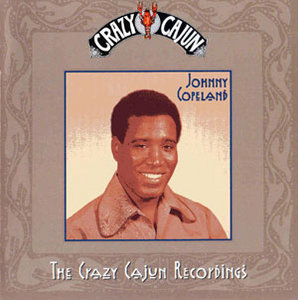Review
The album is kicked off by a quartet of songs among the bluesiest herein , first among them numerically and "bluesically" , “Gonna Make My Home Where I Hang My Hat". This version is a stripped-down predecessor to 1982's Rounder title track. This is Johnny alone, gutbucket as all get-out and it is a rare treat. It's the single purest blues I've heard from Johnny and as raw as yesterday's batch of moonshine. Next up we have two more of Copeland's lost classics: "Stealing" and "Working Man's Blues", both of which are simply fantastic. No collection of Copeland's music is complete without these two crackers, nor for that matter any compilation of post-war Houston Blues. "Stealing" is a thumping devil's sermon well-preached by Copeland in a particularly leonine voice, and is not far off from the work of Guitar Slim at his best. As for "Working Man's Blues", this native Houstonian can tell you that somehow Copeland injected the totality of this city into one blues. Hyperbole? Perhaps. But, to me, this is one of the most evocative blues I have heard in many a moon. Great horn charts and pounding piano, along with Johnny's scraping rhythm and tasty solo, all conspire to summon up a legion of after-dark images of our mutual hometown. Once in an interview Copeland was asked what to him was the blues. His one-word answer: "Texas". Nowhere else in his oeuvre is this conveyed more clearly. All of the above three tunes lead me to wonder what took the blues cognoscenti all those years to "discover" a man of such obvious talents? A spiky guitar intro heralds the arrival of Copeland's fried-in-batter re-make of Lady Day's standard "Ain't Nobody's Business", which builds nicely to a sanctified crescendo and closes out the blues quartet. Three of the next four numbers ("I've Gotta Go Home"; "Hurt, Hurt, Hurt"; "Somethin' You Get") are reminiscent of the Duke/Peacock big-band R&B sound pioneered by that label's legendary in-house bandleader, Joe Scott. "Somethin'" in particular finds Copeland in good voice, the band in fine fettle (especially the sax-man). The above tunes focus almost exclusively on Johnny's under-rated vocal abilities. This man could sing, guitar-god status notwithstanding!The odd tune out of this quartet, "Slow Walk You Down", is something of an oddity in that it would not sound particularly out of place on side two of Abbey Road.Next we move to a duet of touching eulogies to those who preceded Copeland in the pantheon, made all the sadder by Johnny's recent death. The "Johnny Ace Medley" is also an utterly romantic slow-dance number, a smooth remembrance of the Bayou City's suave, tragic balladeer. Ace was found dead backstage at a Christmas Eve concert in 1954, his record atop the R&B charts, supposedly the victim of an unlucky game of Russian Roulette. It was whispered at the time, though never proven, that there were darker forces at work (read: Duke/Peacock boss Don Robey had him "whacked".) At any rate, like Sam Cooke's, Ace's early death robbed the world of years of great music."Coquette" and "Don't Tell Me" showcase Copeland very much in a Crescent City frame of mind. These are mellow, elegiac gulf coast R&B selections with Johnny's guitar accompanying an unknown singer. Each of these displays a strong affinity for Fats Domino, with the latter cut also a little reminiscent of that other Gulf Coast boxing bluesman, Champion Jack Dupree."Four Dried Beans" is an organ-driven rave-up, while the Everlys get the deep-fried Bayou City treatment on Copeland's version of their classic, "Wake Up Little Susie". A bare-bones dance number, "The Hip Hop", closes out the album'soriginal material.
Password and Link:
mississippimoan
FLAC (Image) + CUE + LOG | 227 MB | + Covers
http://www.filefactory.com/file/ca18423/n/jctccr.rar

No comments:
Post a Comment